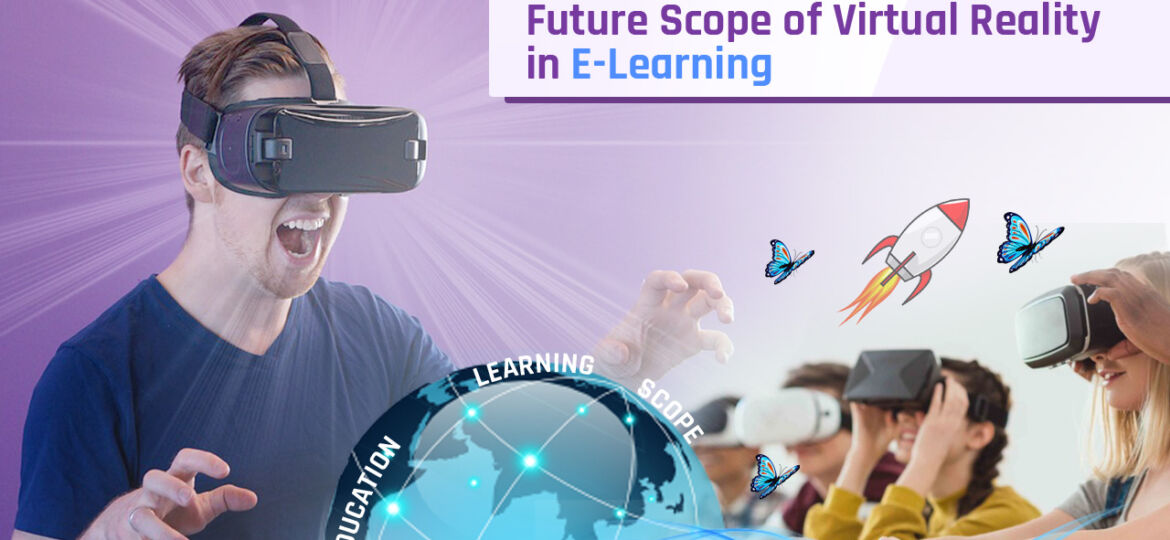
In a rapidly evolving technological world, virtual reality (VR) is no longer a new name. Thanks to the latest smartphones, VR has become more of a household name. How can the E-Learning industry be behind when it comes to using technology? E-Learning companies in India are embracing the new horizon of VR into a learning experience. There is considerable growth in this field of VR in learning in recent few years. If current trends are to be believed, VR is expected to be the next big thing in the E-Learning industry.
What is VR?
VR refers to a 3-D, computerized environment which a person can interact with. The user feels as if he/she is a part of a 3D world. This becomes an immersive experience that engrosses the user in the virtual world.
One needs a specially designed gear popularly known as VR Headset to access the VR content. Google Cardboard is perhaps the simplest and commonly used device that offers visual and auditory immersive VR experience.
VR and E-Learning
In a usual E-Learning environment, learners look at the images/text or interact via clicks, drag and drop, text input. VR, on the other hand, gives a far more immersive experience of the content. VR allows learners to interact with the learning material in a virtual environment. This intensifies the engagement and hence the motivation to learn.
For example, imagine looking at a world map for a geography class. Not very interesting, right? Now, imagine the same class in a VR environment where you can play with a virtual globe and explore the geographical regions. Much more engaging, isn’t it?
VR has opened up new learning environments that were otherwise not possible. For example, one can create courses on how to work in dangerous or high-risk environments, explore with hazardous materials, or perform other complex activities without actually being exposed to such an environment. This gives a hands-on experience with minimal exposure to fatality. Apart from the fun and engagement element, this safety feature makes VR a special innovation in the E-Learning industry. It allows learners to learn from their mistakes and arrive at the right skill set with the freedom to make mistake, try again and learn. For example, a VR-based learning module on hazardous material will allow the learner to practice handling the material virtually without facing actual risks of wrong handling.
Future of VR
With the recent surge in VR compatible Smartphones, VR is quickly becoming a familiar name. Several applications of the VR technology are already on the market. With so much perspective, the possibilities of training by means of VR is stimulating. Let’s look at some industries where VR-based E-Learning is going have the greatest impact.
Medical and healthcare training industry can use VR technology very effectively to train process and procedures. The VR environment will allow the learner to try and practice procedures without any fear of any negative impact on real patients.
A key area where VR technology can revolutionize the training is technician and machine operators. VR will allow the learners to operate machines in virtual environment and thus become experts before putting them on live systems.
Another area that can explore, and is already in the market, is compliance training. VR is extensively being used in “safe” safety training. It allows trainees to experience the consequences of unsafe practices and violation of safety norms. It also helps them get a real-time feel of the actual environment they are going to be into and learn safety procedures precisely.
VR is also beneficial to impart highly skilled trades which necessitate precision and practice. VR provides long-term financial benefit in such cases by eliminating investment in materials for practice allowing trainees to practice the task any number of times till they get it right.
Conclusion
VR is an exciting technology that is already revolutionizing the E-Learning industry. E-Learning companies in India have rightly appreciated its immense potential and embracing the technology to its fullest scale. More and more research is being done and certainly, in near future, VR is going to drive the E-Learning domain.

Very informative